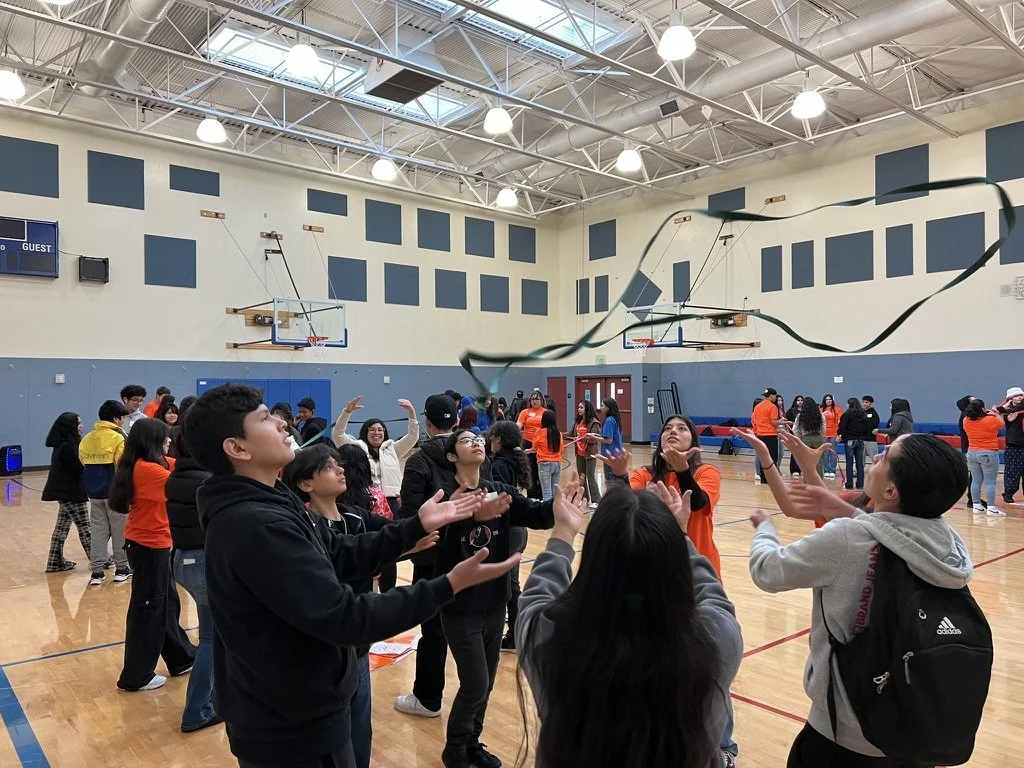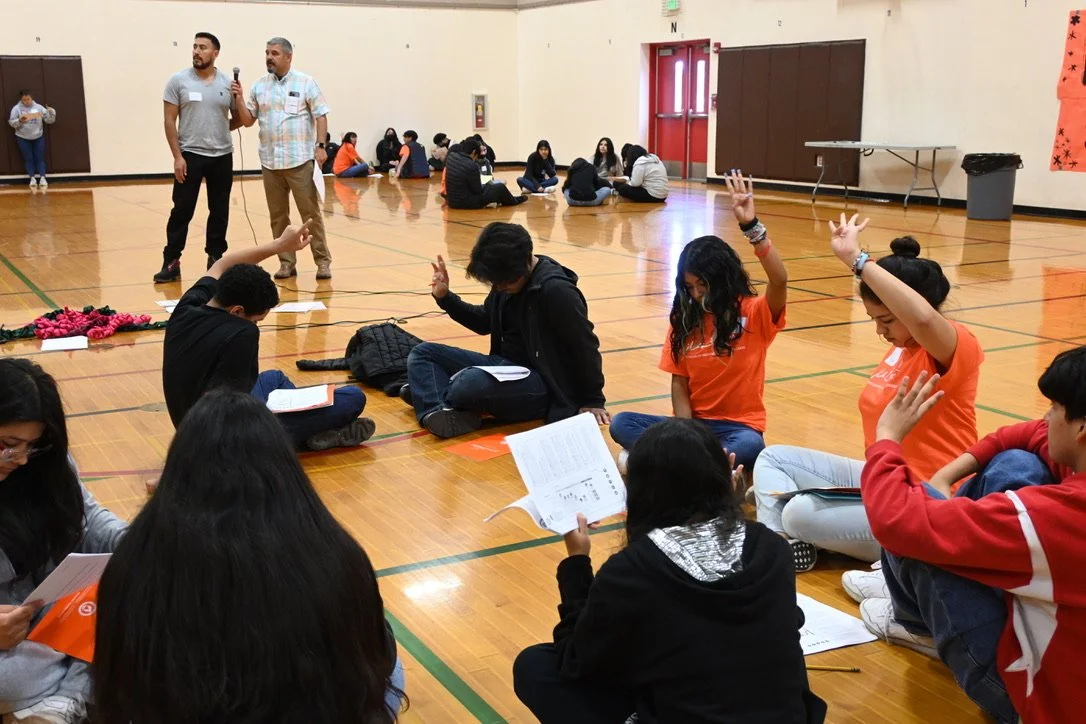Community Questions & Comments
Elma School District
“Safety is not the absence of threat. It is the presence of connection” - Dr Gabor Mate
“Equal rights, fair play, justice, are all like the air; we all have it, or none of us has it.” -Maya Angelou
Project Dates
March 4: Professional Development
March 11-15: School Wide Pre-Survey
March 12: High School Mentor Training
March 14: Middle School Focus Groups
March 21: Equity Academy School Wide Day
Classroom Lesson
School Wide Assembly
Grade Level Circles
March 22: School Wide Post-Survey
Learning Targets
Identity & Dignity:
Understand personal and social identities by exploring cultural contexts and backgrounds.
Foster a sense of belonging by appreciating, validating, accepting, and treating others fairly.
Recognize and honor dignity through actions that promote validation, appreciation, acceptance, and fairness within the community.
Diversity & Inclusion:
Promote comfortable and empathetic interaction with individuals from diverse backgrounds.
Express comfort and joy with human diversity, utilize accurate language for human differences, and establish meaningful connections across all dimensions of diversity.
Reflect on personal experiences with diversity, identify areas of enjoyment and fear, and explore connections and differences across various aspects of human diversity.
Fairness & Justice:
Develop the ability to critically identify bias and nurture empathy for those affected by bias.
Recognize and describe instances of unfairness (injustice), and understand the impact of unfairness on individuals and communities.
Reflect on personal experiences of advantage or disadvantage related to various forms of bias and examine internalized stereotypes or prejudices.
Action & Activism:
Cultivate the ability and confidence to advocate for oneself and others in the face of bias.
Explore ideas, feelings, and experiences related to social justice activism, and engage in dialogue with peers and families.
Demonstrate courage and commitment by modeling fairness and advocating for social justice, fostering cross-identity solidarity, and being an activist voice for children.
Description
The Equity Academy is dedicated to fostering inclusive and just school communities that uphold the dignity and identities of all members. Rooted in the principles of anti-bias education and middle school social justice standards, our program focuses on four core pillars: Identity/Dignity; Diversity/Inclusion; Fairness/Justice; and Action/Activism. Through collaborative efforts, both children and adults learn to navigate diverse environments with respect, fostering a sense of belonging and affirmation for all.
In today's interconnected world, it's essential to equip young people with the skills and dispositions necessary to address complex societal challenges. From the climate crisis to immigration crisis, our students must learn to collaborate with individuals from diverse backgrounds and forge meaningful connections within welcoming communities.
Through engaging activities and discussions, participants develop self-awareness, confidence, and pride in their identities, while also confronting historical biases and prejudices such as ableism, classism, racism, sexism, homophobia, and Islamophobia. By fostering solidarity with historically marginalized communities and honing critical thinking skills, students gain a deeper understanding of the social dynamics at play and are better equipped to challenge injustice and inequality.
At the heart of our approach lies the cultivation of two critical skill sets: critical thinking and somatic awareness. Through practices that involve identifying and expressing emotions and recognizing and responding to bodily reactions and emotions during difficult discussions, participants learn to respond to charged situations in positive and constructive ways. By acknowledging the historical contexts that shape our perceptions and fostering empathy and understanding, we strive to create a more inclusive and just society for all.
Pre & Post Survey
Description:
The Equity Academy pre and post survey is designed to assess students' understanding, attitudes, and perceptions related to equity, belonging and wellbeing. Rooted in the principles of anti-bias education and middle school social justice standards, our program focuses on four core pillars: Identity/Dignity; Diversity/Inclusion; Fairness/Justice; and Action/Activism. The survey consists of questions that cover various aspects of these pillars, providing valuable insights into students' experiences and perspectives.
Purpose:
The purpose of the pre and post survey is to measure the impact of the Equity Academy's programming on students' knowledge, attitudes, and behaviors related to equity, school safety, and connections. By administering the survey before and after the program, we can assess changes in students' understanding and perceptions over time, allowing us to evaluate the effectiveness of our curriculum and identify areas for improvement.
High School Mentors
At the Equity Academy, we believe in the power of mentorship and peer support. High school mentors play a vital role in our program by guiding middle school students through discussions and experiential learning activities. These mentors lead small groups, offering guidance, encouragement, and insights based on their own experiences. By fostering intergenerational connections and providing role models, we aim to create a supportive community where everyone can learn and grow together.
High School Mentor Training: Prior to the day of learning, high school mentors will undergo comprehensive training to prepare them for their role in facilitating grade-level workshops. This training will equip mentors with the skills and knowledge they need to effectively lead discussions, promote respectful dialogue, lead activities, and support their peers in exploring complex social issues.
Learning Outcomes for High School Mentors:
1. Facilitation Skills: High school mentors will demonstrate proficiency in facilitating group discussions, promoting respectful dialogue, and managing group dynamics during grade-level workshops. They will practice experiential learning activities, games, and initiatives.
2. Community Building: High school mentors will foster intergenerational connections and provide role modeling for middle school students, creating a supportive community where everyone can learn and grow together in an inclusive and just environment.
3. Understanding of Social Justice Concepts: High school mentors will deepen their understanding of key social justice concepts and vocabulary, including identity, diversity, inclusion, and social stratification in order to effectively guide middle school students through discussions and activities.
4. Empathy Building: High school mentors will develop strategies for promoting empathy and understanding among workshop participants, including active listening, perspective-taking, and creating safe and supportive spaces for dialogue.
5. Critical Thinking and Analysis: High school mentors will enhance their critical thinking skills through reflection on personal experiences and perspectives related to social justice issues, as well as through analysis of historical and contemporary examples of injustice, inequality, and solidarity.
6. Somatic Awareness: High school mentors will cultivate somatic awareness, recognizing and responding to bodily reactions and emotions in themselves and others during discussions on sensitive topics, in order to promote emotional regulation and constructive dialogue.
7. Preparation and Logistics: High school mentors will understand the workshop format and logistics, including time management, group size, and materials needed, in order to effectively prepare and lead grade-level workshops during the Equity Academy's day of learning.
By achieving these learning outcomes, high school mentors will be well-equipped to fulfill their role in facilitating grade-level workshops and supporting middle school students in exploring complex social issues during the Equity Academy's day of learning.
Middle School: Grade Level Focus Groups
As part of our preparation for the Equity Academy's school wide day of learning, we will be conducting grade-level focus groups with 12-24 students from each grade. These focus groups provide an opportunity for students to share their thoughts, perspectives, and experiences related to equity, diversity, and social justice in a smaller and more intimate setting. During these sessions, trained facilitators will guide discussions around key topics and questions relevant to each grade level. Students will have the chance to express their thoughts, ask questions, and engage in dialogue with their peers in a supportive and respectful environment.
The insights gathered from these focus groups will inform the development of our day of learning curriculum, ensuring that it is responsive to the needs and interests of our student body. By actively involving students in the planning process, we hope to create a program that is relevant, engaging, and meaningful for all participants Ultimately, the grade-level focus groups serve as a vital step in our efforts to cultivate a school culture that values diversity, fosters empathy, and promotes social justice. We are excited to hear from our students and incorporate their voices into our upcoming event.
Focus groups will be led be Equity Institute co-founders, Vincent Perez and Kim Jansen.
Focus Group Questions:
These questions are designed to encourage students to reflect on their own experiences, share their perspectives, and provide valuable insights that can inform the development of the Equity Academy's curriculum.
1. What does the term "equity" mean to you? How do you think it applies to our school community?
2. In what ways do you think our school can be more inclusive and welcoming to students from diverse backgrounds?
3. How do you think we can better celebrate and embrace the cultural diversity within our school?
4. What role do you think students play in creating a supportive and respectful school environment?
5. What do you think are the biggest challenges students face in feeling like they belong at our school?
6. Can you share any ideas or suggestions for activities or discussions you would like to see during the Equity Academy's day of learning?
Classroom Lesson
In this lesson, students will explore equity, fairness, and solidarity through a brief examination of the disability rights movement. They will define key terms such as equity, fairness, and solidarity, and discuss their importance in advocating for social change. Through case studies and examples, students will learn about instances of solidarity within the disability rights movement, recognizing the power of collective action. Additionally, students will explore the life and activism of Judy Heumann, a prominent figure in the movement, gaining insights into her advocacy efforts and their impact. By reflecting on the lesson and considering how strategies used in the disability rights movement can be applied to their own lives, students will deepen their understanding of equity and empowerment.





